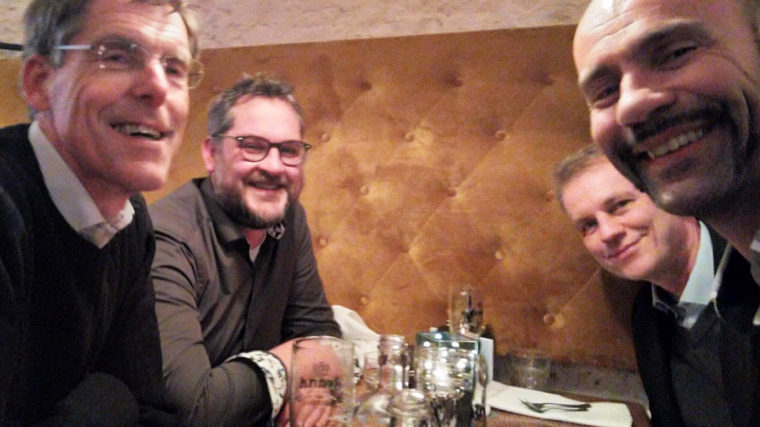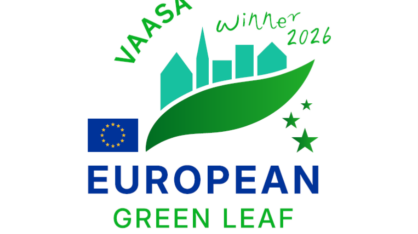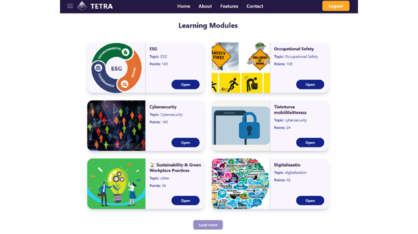From left to right René Klep, Pieter Schep, Thomas Sabel, Peter Smeds.
Background
The co-operation “Creating Sustainable Business Solutions”, in form of a 30-credit point minor, between the School of Business in VAMK and the School of Economie en Bedrijf in Avans Hogeschool, den Bosch, the Netherlands, is the most extensive international co-operation that VAMK’s School of Business is running at the moment. There have been three implementations so far (by March 2022), spring 2021, autumn 2021, and spring 2022 with a total of more than 100 students and 10 teachers participating. The Dutch students carry out all 30 credit points, whereas the Finnish students can choose more freely among the modules that are offered within the minor. The course Project assignment (8cr) is the flagship of the minor, compulsory for all participating students. During the three implementations to date, the course has carried out two different projects for Wärtsilä and one for a Vaasa-based energy project called FESIO. This is the story of how it started.
Erasmus exchange and goal
This co-operation took its first steps in November 2014, when Peter Smeds and the author (both Senior Lecturers in VAMK) were on Erasmus exchange in Belgium. One of the objectives that we set for ourselves when going there was that we want to expand our network and, foremost, start a close co-operation with another European institution of higher education.
The most obvious candidate was the Belgian host university, by analysis regarded to be a suitable strategic partnership. We had fairly good contact with them already and other members of VAMK’s staff had paid visits there already. I and Peter made several proposals to different members of their organization. Either they were too reserved for our proposals or maybe we were too offensive. The result was anyway close to nothing. Afterward, I’ve been thinking that perhaps their representatives didn’t like our approach and/or we, unconsciously, felt that they are good and nice people, but maybe not the best partner for us.
How we got to know Pieter and René
In the evening, after the farewell dinner, we decided to sit down in the hotel lobby bar to contemplate the fact that we failed regarding our co-operation objective, no strategic partner university in the luggage back home. At this moment of more or less deep self-examination, two guys (also participants in the same event as us), Pieter Schep and René Klep from Avans Hogeschool, said hi, can we join you? “Of course, please do”. As the hours went by, the mood got better. During this, extremely informal discussion, we learnt quite a lot about both the supply and needs of our respective universities, but, maybe most of all, about our new-found friends. Come the small hours we already had a spec for co-operation and, since Pieter and René were staying at the same hotel, we had the opportunity to confirm our nocturnal discussion during breakfast the next morning.
Keeping in touch
During the next few years, we regularly kept in touch with our Dutch colleagues. Both Pieter and René as well as other Avans lecturers visited VAMK. Our Dutch network grew and it was a pleasure to work together with like-minded people. Fishing trips and dinners interspersed with teaching and planning contributed to a positive atmosphere. Since we got to know each other better and better, both professionally and on an individual level, it was fairly easy to openly discuss the needs and wants of both parties. In spring 2019, I and Peter finally went to visit den Bosch. During this visit, we agreed on the establishment and contents of a minor called “Creating Sustainable Business Solutions”. We continued with planning and refining all the details, and in the autumn René and Niels Willemsen from Avans came to visit us. Kenneth Norrgård from VAMK also joined the troops and the setup was more or less ready.
Meaning of chemistry and meet the right people
My main point with this text is to describe the process of creating a lasting, permanent, co-operation between two parties. Understanding that this is only one process out of the countless amount of other possibilities, my firm opinion is that personal chemistry and like-minded representatives of the contracting partners are of far higher importance than formal strategic choices of partners. Objectively, the Belgian host would, for a handful of reasons, have been a strategically more suitable partner. The fact that we were able to establish personal relationships with the Avans representatives, however, outweighed the strategic benefits.
Is there support for my, most unscientific, empirical experience? Gummeson (2002) describes different values in business relationships. One of the values is about mutual long-term goals and co-operation as an important part of the birth of relationships. In addition, there should be benefits for all parties involved. Gummeson also emphasizes, as another value, that business relationships will not benefit from extensive bureaucracy. In a conclusion, he argues that good personal relationships are of high importance. Fourniere et al. (1998) mention reciprocity as one of the cornerstones in relationships and also Nordegren (2004) argue for reciprocity as the most important prerequisite for long-lasting and beneficial relationships. Gummeson (2002) adds that many actors choose to co-operate with friends since friendship properties like friendliness, trust, and loyalty are sought for in business relationships. Mentioning this, I also need to mention that both Gummeson and other authors stress the danger of friendship turning into nepotism and thus leading to less favorable decisions.
In conclusion, I can say that friendship and positive personal chemistry as mediators for beneficial co-operation find support in both literature and my personal experience. By no means scientifically proven, but enough for me to say; get out there and socialize!




